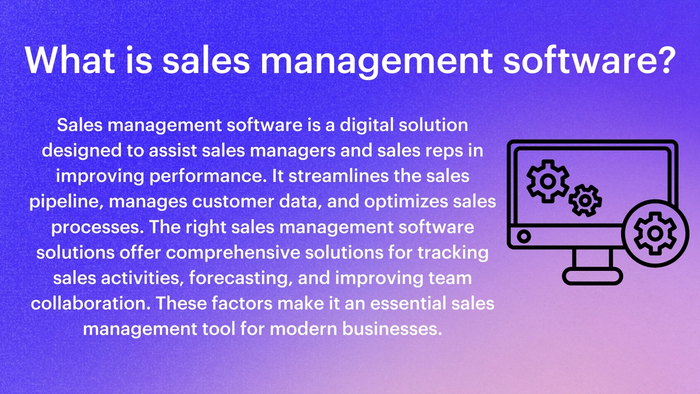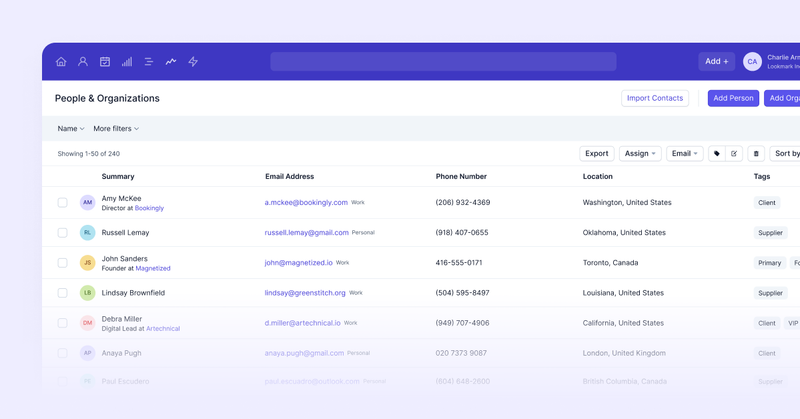Sales teams without the ability to collaborate are like cars without engines - they have the potential to move forward, but they lack the driving force needed for motion.
The ability to work together effectively is critical.
This is where sales management software comes in - to offer a lifeline to teams striving for efficiency and success.
With its ability to streamline communication, organize data, and provide real-time updates, this technology is not just a tool but a catalyst for collaborative selling.
Let's see how sales management software is transforming the landscape of team-based sales strategies and making the journey from potential to achievement more coordinated.

The importance of collaborative selling in modern sales teams
Collaborative selling has become a cornerstone of modern sales strategies. It reflects a shift towards more integrated and team-oriented approaches.
This method leverages the collective strengths, insights, and expertise of the entire sales team, as well as other departments.
It's done to deliver a more comprehensive and personalized customer experience.
Below, we explain why we think that collaboration is absolutely essential in sales today:
Streamlining the sales process
Collaborative selling streamlines the sales process by keeping all team members aligned on goals, strategies, and customer messaging.
This alignment offers a consistent and efficient approach to each opportunity. It allows for a smoother customer journey, from initial contact through to post-sale support.
Adrian Mendoza – Global Account Executive
"Capsule CRM transforms teamwork with its teams and comment features, making every deal a collaborative effort. By delegating leads within teams and using real-time comments to communicate, we eliminate unnecessary emails and speed up decision-making.
Whether it’s checking on payment processing or getting a quick quote, everything happens in one place, keeping our workflow seamless and efficient."
Enhanced customer understanding
Collaborative selling allows sales teams to pool their insights and knowledge. This leads to a deeper understanding of customer needs and challenges.
Such collective intelligence initiates the creation of tailored solutions that address specific customer pain points. The outcome? A significantly improved chance of closing deals.
Leveraging diverse expertise
In today's complex sales environment, no single salesperson has all the answers. Collaboration brings together diverse expertise. As such, all aspects of a customer's problem are considered.
The synergy of different departments, from marketing to product development, enriches the sales process and offers customers a solution that truly fits their requirements.
Building stronger relationships
Collaborative selling fosters stronger, more resilient customer relationships. This happens through involving multiple touchpoints and perspectives in the sales process.
Such an approach demonstrates a commitment to truly understanding and meeting customer needs, which can enhance trust and loyalty.
Harry Thomson – Global Account Executive
"A centralized CRM like Capsule eliminates information silos, ensuring every team member has access to up-to-date customer data.
With real-time collaboration tools, shared dashboards, and automated tasks, we reduce unnecessary meetings, streamline processes, and improve our lead-to-customer ratio. Better cross-team communication doesn’t just make our work easier, it enhances the client experience and strengthens long-term relationships."
Driving innovation and continuous improvement
Finally, collaborative selling encourages a culture of continuous learning and improvement. From our perspective, as teams work together and share insights, they uncover new opportunities for innovations.
What kind of innovations? Here, we mean products, services, and sales tactics. This ongoing evolution is essential for staying competitive in a rapidly changing market.
Generally speaking, collaborative selling is not just a strategy but a necessity in the modern sales landscape. It boosts customer engagement, leverages collective expertise, and drives innovation. So now you can see why it's a key factor in achieving sales success.

Key features of sales management systems
Key features of a sales management tool include:
- Customization: tailor it with custom fields, tags, milestones, and more to fit your business needs.
- Email integration: forward emails to a unique address for easy storage within your account, or send email campaigns to grow your business.
- **Custom fields: record vital information specific to your business.
- Sales pipeline customization: adjust your sales pipeline steps to match your workflow.
- Branding: customize your login screen with a logo and color scheme.
- Activity types: add unique activities that are meaningful to your business.
- Tags: use tags to categorize or group contacts based on your business requirements.
- Lists: manage contacts in lists, filtering by custom criteria.
- Lost reasons: identify common reasons for losing deals by adding custom lost reasons.
- Data tags: further categorize or group contacts with DataTags.
- Custom titles: personalize contact information with custom titles.
These features enhance the flexibility, efficiency, and personalization of managing sales processes.
How to choose the best sales management software for your sales team
Choosing the best sales management software for your sales team involves several steps.
You want to be certain that the solution meets your business needs and improves your sales processes.
Here's a step-by-step guide:
1. Assess your sales process needs
Start by evaluating your current sales processes. Identify the challenges your sales team faces, such as customer relationship management or data analysis.
Understanding these needs helps when selecting software that addresses your specific pain points.
2. Look for customization and scalability
Choose software that offers customization options to tailor the system to your business's unique processes and workflows. Additionally, consider scalability. That's because the software should grow with your business.
With that, you'll be able to accommodate more users, data, and develop sales strategies without significant upgrades or migrations.

3. Evaluate integration capabilities
The best sales management software should seamlessly integrate with other tools your team uses. This means email platforms, marketing automation software, customer service solutions, and so on.
Integration gives you a unified platform for all customer interactions and data. What's more, it has the potential to boost your efficiency and provide a comprehensive view of the sales funnel.
4. Check for real-time analytics and reporting features
Access to real-time analytics and reporting is fundamental for making informed decisions. The software should offer detailed insights into sales performance, customer behavior, and market trends.
This lets sales managers adjust strategies promptly and focus efforts where they are most needed.
5. Consider user experience and support
Look for software with an intuitive interface that's easy for your team to adopt and use. A steep learning curve can negatively affect adoption and productivity.
Additionally, consider the level of customer support provided. With reliable support, any issues are promptly addressed - so you can minimize disruptions to your sales activities.
6. Read reviews and request demos
Before making a decision, read reviews from current and past users to understand their experiences with the software. Look for feedback on performance, reliability, and customer service.
Request demos or trial periods to test the software's functionality and see whether it meets your expectations.
7. Compare pricing and total cost of ownership
Finally, compare the pricing of different sales management software options. Consider the initial cost as well as the total cost of ownership. Don't forget to take into account any additional fees for support, training, or integrations.
Choose the software that offers the best value for your investment.
Capsule: your new sales management software
To fully maximize the effectiveness of collaborative selling, you need the proper tool for that purpose.
Luckily for you, we've got just what you need.
Capsule is your next-level sales management software, designed to streamline your sales process and enhance customer relationships.
With Capsule, you gain a powerful tool that brings efficiency and clarity to your sales activities.
Here's why Capsule stands out:
- Customization at your fingertips: tailor everything from fields to sales milestones, so that the software adapts to your unique business needs.
- Seamless email integration: easily store emails by forwarding them to a unique address linked to your account to keep all communication in one place.
- Enhanced customer insights: with comprehensive customer profiles, track every interaction to better understand and serve your clients.
- Efficient lead management: quickly capture leads and track them through your sales pipeline for improved conversion rates.
- Real-time reporting: Make informed decisions with up-to-date reports on sales performance and trends.
- Collaborative tools: improve team collaboration with shared calendars, tasks, and documents, to keep everyone aligned and informed.
- Mobile accessibility: access your sales data on the go with Capsule's mobile app to stay flexible and responsive to customer needs anytime, anywhere.
- Security and reliability: trust in a platform that prioritizes your data's security with regular backups and robust encryption - all so that your information is safe and always available.
Incorporate Capsule into your sales strategy to not only meet but exceed your sales targets with an organized, efficient, and scalable approach.
This comprehensive suite of features makes Capsule an indispensable tool for sales teams aiming for peak performance and customer satisfaction.
Try it today - completely for free.

Key Takeaways
- Sales management software is essential for modern sales strategies since it offers a lifeline to teams aiming for efficiency and success.
- It streamlines communication, organizes data, and provides real-time updates.
- Key features or a reliable tool include customization, seamless email integration, enhanced customer insights, and real-time reporting, among others.
- Benefits of implementing such a system include streamlined sales processes, enhanced customer relationship management, improved decision-making, increased sales efficiency, and better forecasting and reporting.
- Choosing the right software involves assessing needs, looking for customization and scalability, evaluating integration capabilities, checking for analytics and reporting features, considering user experience, and comparing pricing.
- Collaborative selling enhances customer understanding, leverages diverse expertise, streamlines the sales process, builds stronger relationships, and drives innovation.
- Capsule CRM stands out for its customization options, seamless email integration, comprehensive customer profiles, efficient lead management, and collaborative tools.
Conclusion
Embracing reliable sales management software is not just an option but a necessity.
That's if you aim for top-notch collaborative selling, of course.
It empowers teams to exceed their sales targets through efficient, organized, and scalable strategies.
For these reasons, we strongly recommend taking advantage of tools like Capsule.
Give it a go and see how we can help you.
FAQs
Software sales management is the use of digital tools to oversee and enhance the sales process, including customer data handling, sales forecasting, and team coordination.
The best software for sales varies depending on needs, but often includes features like lead management, sales forecasting, and integration with other sales management tools.
Sales management software is also known as sales team management software or a sales management system, designed to streamline sales processes and strategies.
Salespeople use a variety of software, including CRM systems for customer data, sales management systems for tracking sales data, and tools for sales strategy and lead management.
Collaborative selling involves promoting teamwork,cross-functional collaboration, and knowledge sharing so you can close deals faster. Instead of individual sales reps working in isolation, different team members, departments, and even external partners work together to provide prospects with a better buying experience.
Sales management is crucial when it comes to streamlining the sales process. It provides a structured strategy and oversight ensuring that sales teams follow best practices, meet their sales goals, and have the necessary tools, data, and insights to effectively engage with prospects. With the right sales management tools. Businesses can improve their lead tracking, optimize their pipelines, and drive consistent revenue growth.
Collaboration within a sales team needs to involve open communication, shared insights, and coordinated efforts to nurture leads and close deals. This includes team members working together on account-based selling strategies, using shared data to personalize outreach, and leveraging sales management software to track progress and optimize efforts. Effective collaboration helps sales teams operate more efficiently and deliver a seamless experience for prospects and customers.
Sales management oversees the entire sales process, from lead generation to deal closure. This ensures efficiency and alignment with business goals but also involves setting sales strategies, monitoring performance, coaching sales reps, and utilizing technology to streamline workflows. Sales management software enhances this role by providing data-driven insights, automating administrative tasks, and fostering collaboration, allowing teams to focus more on building strong customer relationships and closing deals.




